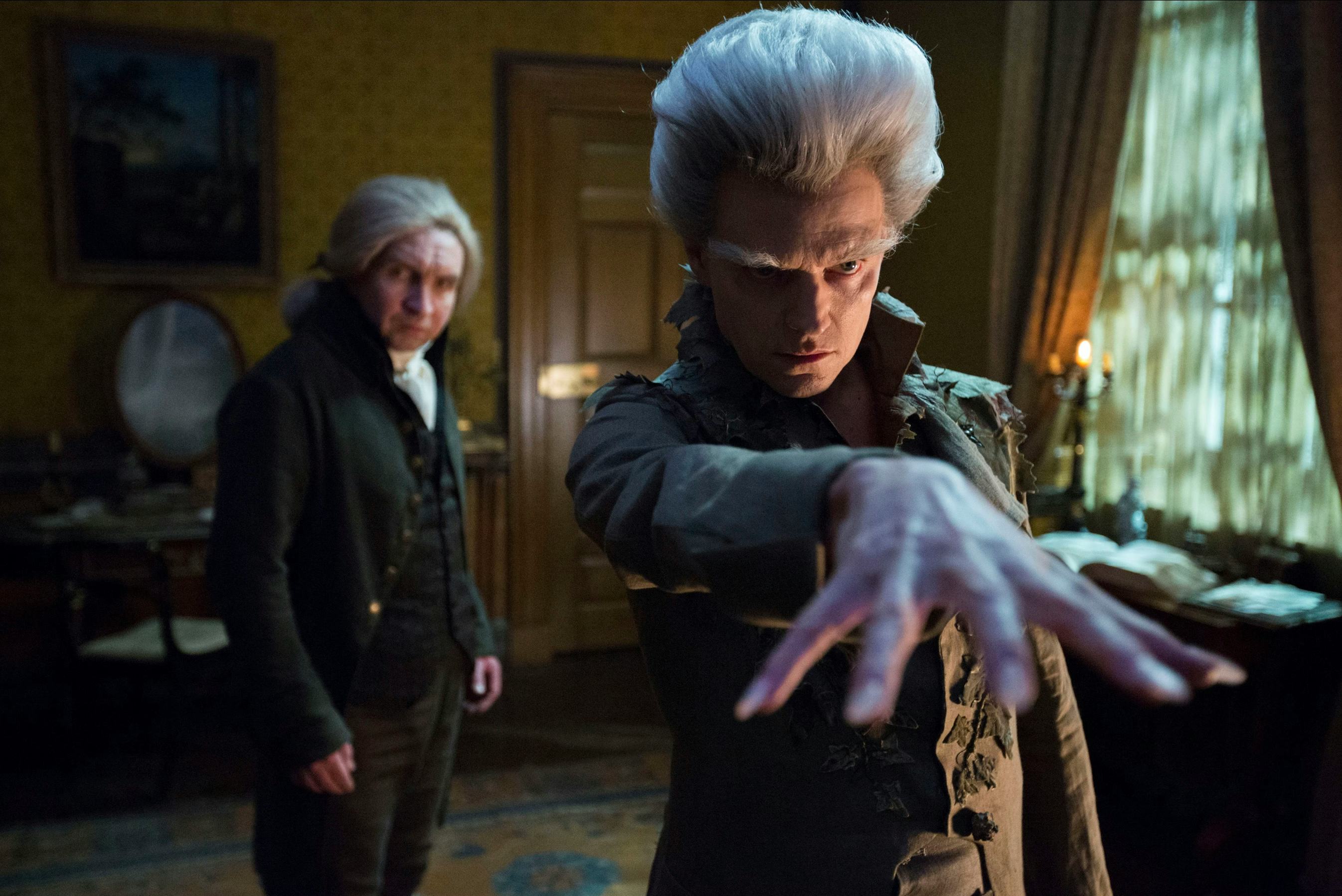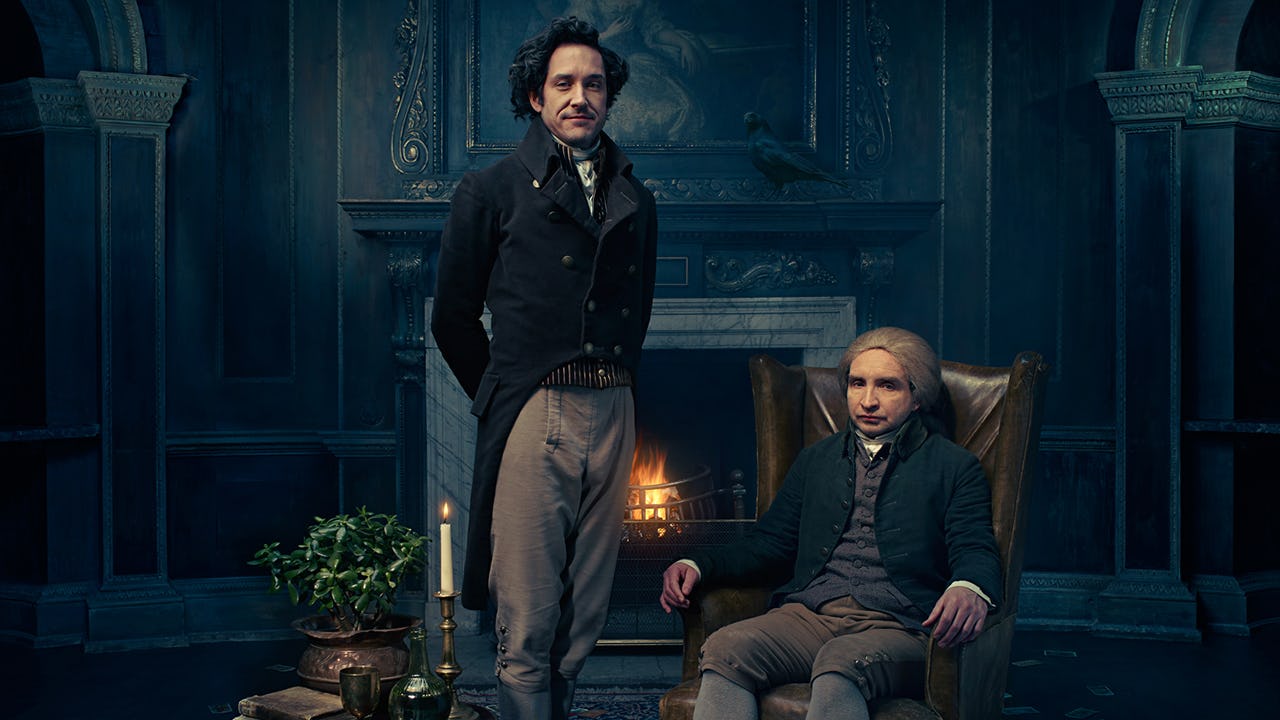
Despite its bestseller status, Susanna Clarke’s Jonathan Strange and Mr Norrell was an underdog choice for a TV adaptation. Lacking the action/adventure elements of post-Game of Thrones fantasy hits like The Rings of Power, The Wheel of Time, or The Witcher, it centers on an ideological dispute between two magical scholars, one of whom is purposefully characterized as the dullest man in England. Not an obvious sell, cinematically speaking.
Drawing from 19th century literary influences, the original novel narrates its tale in a wryly observational tone, stuffed with lengthy footnotes and peppered with Dickensian side-characters. Meandering its way through a decade of the Napoleonic Wars, it introduces a version of England where magic plays an influential role in society, but class divides and Regency-era foibles drive much of the story’s conflict.
With its Jane Austen-like authorial voice and unglamorous cast of squabbling academics, Jonathan Strange and Mr Norrell feels like the kind of idiosyncratic text that either receives a hideously botched adaptation, or is considered too ambitious to film. But against all the odds, the BBC’s 2015 miniseries not only stayed true to the novel, but emerged as one of the best fantasy adaptations ever made.
Written by Peter Harness (Doctor Who) and directed by Toby Haynes (Andor), the BBC’s Jonathan Strange and Mr Norrell succeeded because it tapped into Britain’s long tradition of historical prestige TV.
It’s virtually impossible to work in the U.K. film industry without dipping your toe into 19th century fiction, so everyone involved knew what to expect from Susanna Clarke’s synthesis of gothic fantasy and witty Regency drama. Among the main cast, the young bride Lady Pole is a classic gothic waif, suffering from an incurable ailment and constrained by a powerful, malevolent man. Secondary characters like John Segundus, Mr Honeyfoot, Lascelles and Drawlight play into familiar archetypes within England’s social strata, illustrating a culture where petty snobs undermine well-meaning individuals from less prestigious backgrounds. Then in the foreground, the title characters Jonathan Strange (Bertie Carvel) and Gilbert Norrell (Eddie Marsan) represent a twist on the Byronic hero and the miserly Dickensian eccentric, respectively.
Jonathan Strange and Mr Norrell’s England is a place where magic used to thrive, but has effectively been extinct for hundreds of years. By the turn of the 19th century, “magicians” are basically amateur historians who study the theory of magic. So when the fastidious recluse Gilbert Norrell reveals his ability to perform real, practical magic, he unwittingly sparks a revolution.
An intrinsically conservative and controlling man, Norrell reacts with reflexive paranoia toward anyone who tries to follow in his footsteps, hoarding the nation’s supply of ancient spellbooks and taking legal action to sabotage his supposed rivals. But in Jonathan Strange, he finds his match.
Strange starts out as a cheerful young aristocrat, living a largely purposeless life until he discovers his incredible talent for magic. Quickly becoming obsessed with his new hobby, he develops innovative magical techniques while Norrell remains stuck in the past. In doing so, Strange becomes a national celebrity, providing a more accessible counterpoint to Norrell’s off-putting personality and elitist attitude.

As these two men inspire clashing approaches to practical magic, England’s magical ecosystem begins to awaken, bringing with it the threat of invading forces from the fairy realm. One fairy, “The Gentleman with Thistledown Hair,” becomes a recurring villain who haunts the background of Strange and Norrell’s exploits, embodying a terrifyingly inhuman set of values and supernatural powers. Yet this isn’t really a story about conventional battles between good and evil.
While Norrell is an intentionally unlikeable — often laughable — figure, his rivalry with Strange is more about personal hubris than anything else. By the end of the novel, their ambitions give way to a more complicated narrative about societal upheaval, as other characters make their own mark on the concept of “English magic.” In the TV version, Norrell’s secretive manservant John Childermass (Enzo Cilenti) provides a particularly compelling contrast to the two leads, offering a working-class perspective on a conflict dominated by wealthy egomaniacs.
With just seven episodes to adapt a dense 800-page novel, the BBC’s Jonathan Strange and Mr Norrell inevitably sands down the complexity of its source material. However it’s still a startlingly impressive adaptation, not just in how it brings its characters to life, but in the way it adds a gloomy, otherworldly atmosphere to its Regency-era setting. Its only real flaw is the baffling miscasting of its fairy antagonist (Marc Warren), whose screen presence is more cartoonish than intimidating.
Overshadowed by more prominent fantasy dramas at Netflix and Amazon, Jonathan Strange and Mr Norrell now feels like a half-forgotten gem. Honestly, it's not hard to understand why. Publicity-wise, the BBC didn't really understand how to promote the show's peculiar cross-genre appeal, and it didn’t receive a particularly buzzy U.S. release. A decade on, this well-crafted miniseries deserves more attention than it received at the time, quietly outshining many of its better-known peers.







